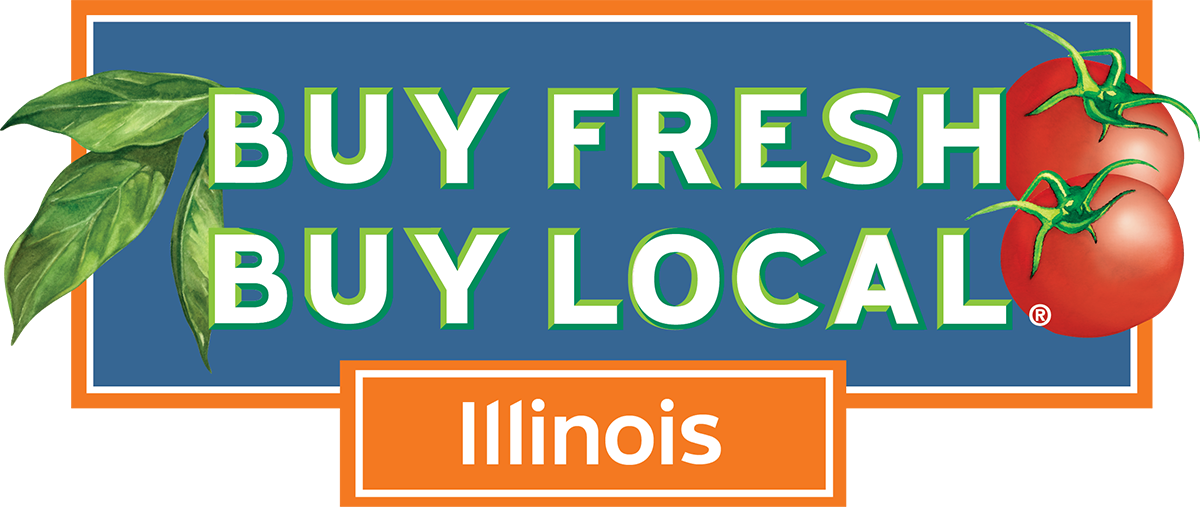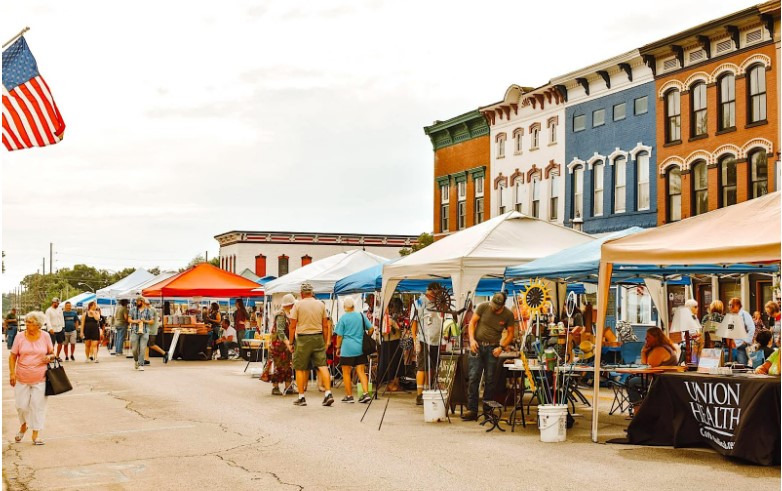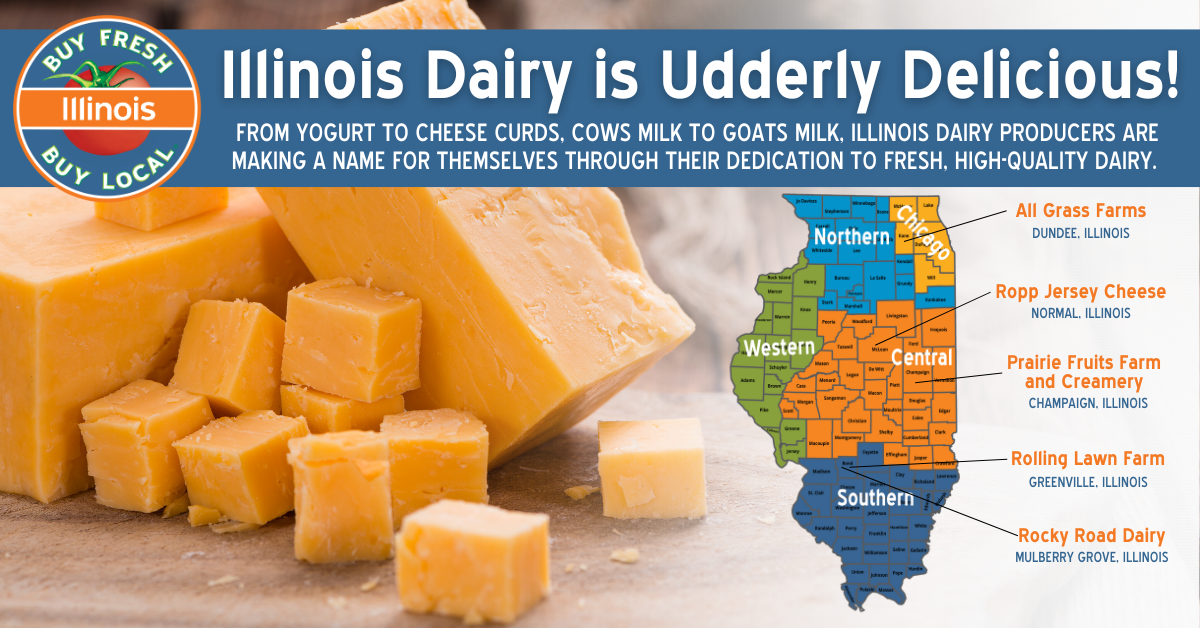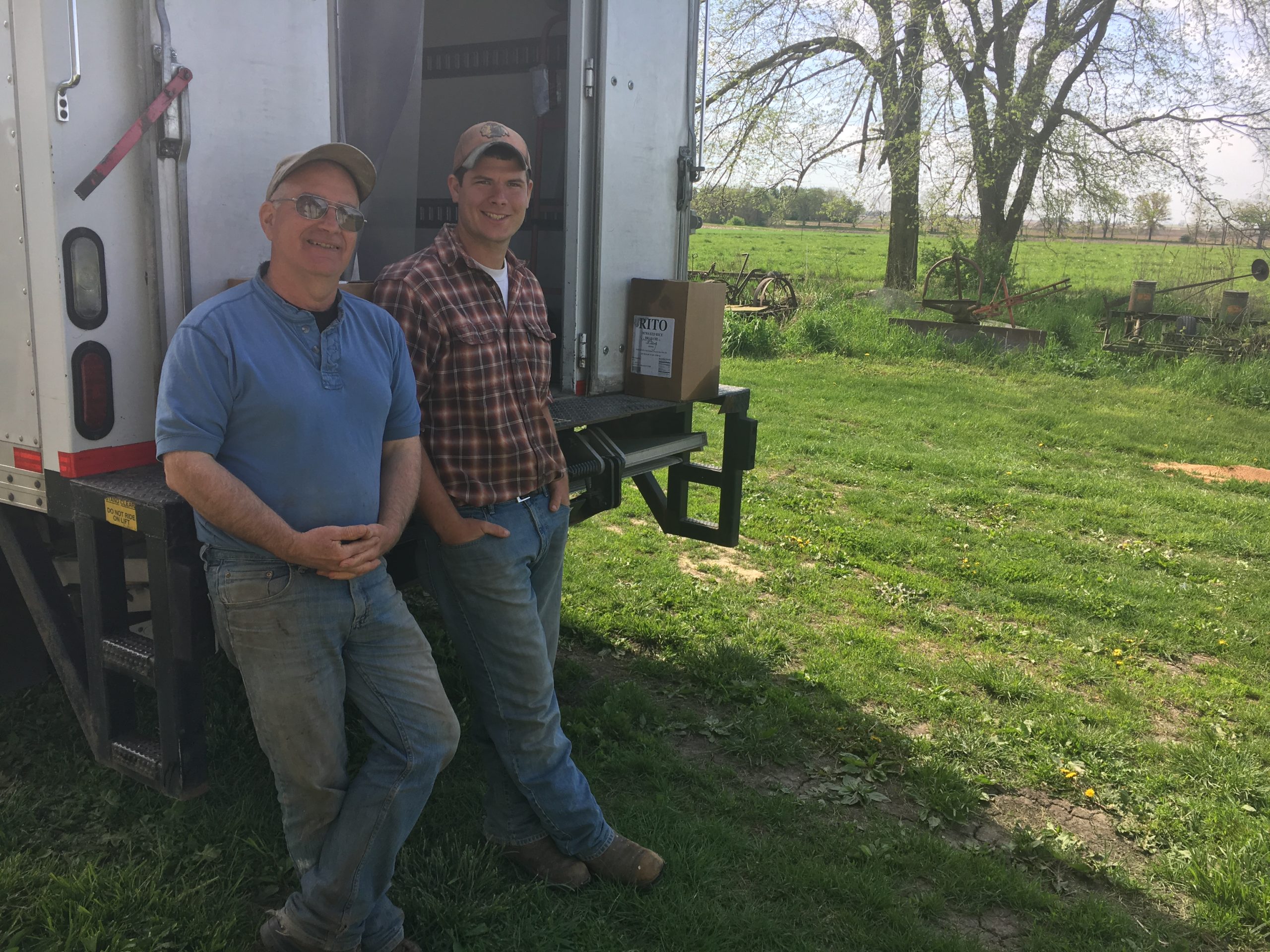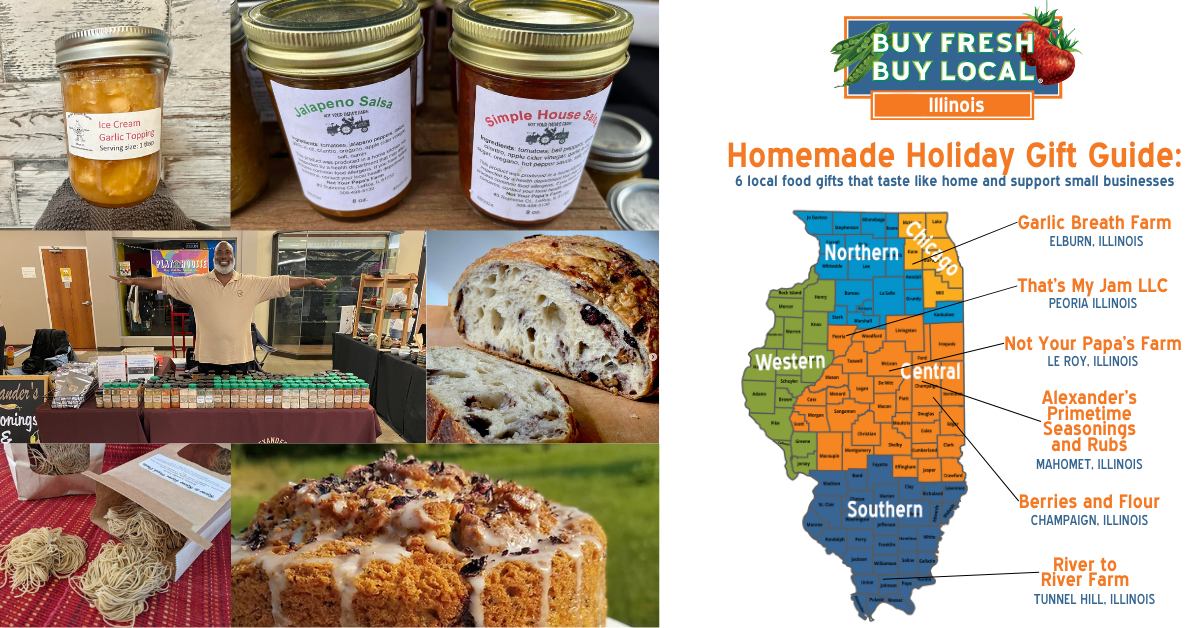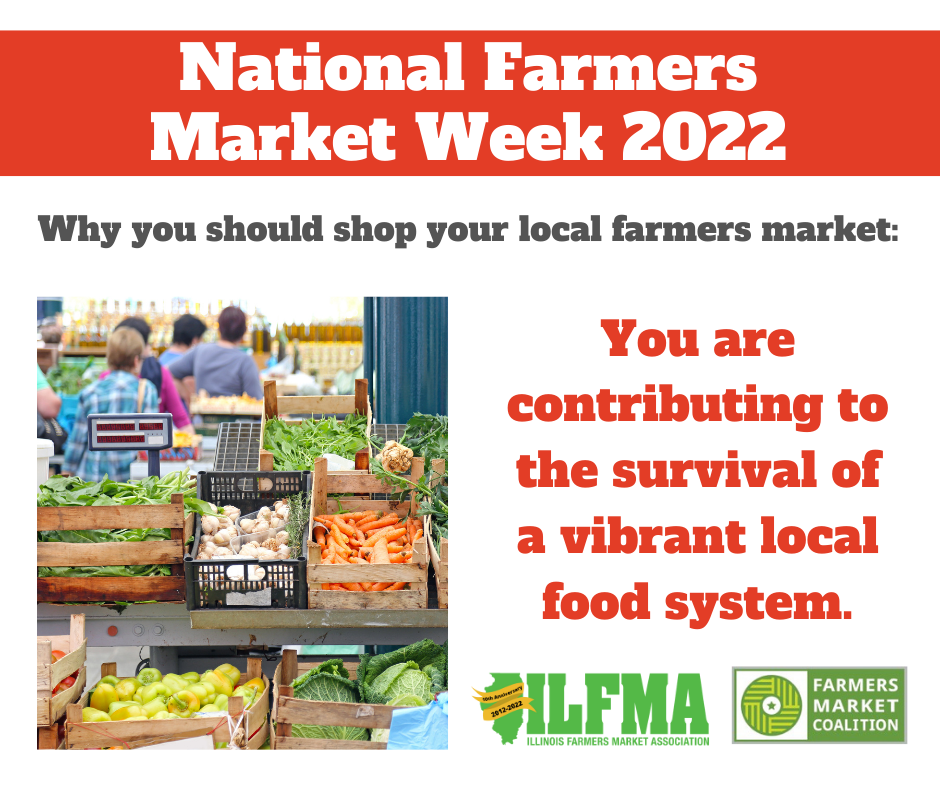
National Farmers Market Week — August 7-13 this year — celebrates the role that the more than 300 Illinois farmers markets and the more than 8,000 markets nationwide play in helping build a better food system and supporting local economies.
Each farmers market is as unique as the community that hosts it. This month check out three very different markets. Mercado de Colores in bustling Chicago is focused on serving the large Latinx population in the Little Village neighborhood on the city’s South Side. The Macomb farmers market in the western Illinois is one of the oldest continuously operating markets in the state. By contrast, the farmers market in little Marshall, located in southeastern Illinois, just launched this year.
Mercado de Colores: A Chicago Park Channels a Mexican Village Square
Walk down West 26th Street in Chicago’s Little Village neighborhood six days a week and you’ll come upon Manuel Perez Jr. Plaza, a quiet, tree-filled community space in the midst of a commercial strip. On Saturdays, though, the plaza becomes Mercado de Colores, a farmers market that is a replica of a village square in Mexico, festooned with colorful cloth flags.
Little Village (also known as La Villita) has 75,000 residents, 83 percent of whom are Latinx, with the vast majority having roots in Mexico. Nearly two-fifths of its people were foreign-born. It is also one of the most economically challenged Chicago neighborhoods that host a weekly farmers market: Average incomes are much lower and the poverty rate much higher than for the city as a whole.
As in many under-resourced communities, many residents of Little Village have limited access to fresh, locally produced food. Planning for Mercado de Colores, which addresses that food access issue, began in 2019, but the market opened in 2020 in the middle of the first wave of the COVID-19 pandemic. While that posed challenges, it could not have been better timed as need rose in Little Village, with its dense population, large number of residents who lack health insurance, and blue-collar workers who were deemed essential and had to go to work when others were sheltering in place.
According to the market’s website, “More than ever, initiatives like the Mercado de Colores of Little Village are needed. An initiative that provides access to healthy and agro-ecological goods and focuses on strengthening economic independence, family unity, dignified work, health and environmental awareness, in a fair, honest, safe and sustainable way, with the purpose of improving the quality of life of families.”
Mercado vendor David (pronounced dah-VEED) Toledo is owner/operator of Contemporary Farmer Inc., which grows microgreens indoors in the Back of the Yards neigborhood on Chicago’s South Side; he is also a food justice activist and a member of the ILFMA Board of Directors. David notes that the market goes to lengths to make sure the mix of food and handmade crafts are culturally relevant to the neighborhood residents.
“I think that we’re intentional about having vendors that represent the community,” David said. David noted that Dulce Cedillo, a market organizer whose Cedillo’s Fresh Produce is grown at her South Side urban farm, “sells her epazote and her cilantro, and she’s able to speak the language of individuals and make that connection of health and local food and her product to that specific Little Village community.”
David also exemplifies the food education role that Mercado de Colores plays for its customers. Microgreens are not a common part of Mexican food culture, but David grows them from plants that are well recognized, such as radishes, cilantro and beets, and he makes a mix of them that is intended for topping tacos.
Microgreens also are perfect to grow indoors in the limited spaces that most community residents have, and David takes his teaching role to the max. “I love to make those connections anytime,” he says. “Sometimes I’m talking and I forget to make a sale because I’m just wanting to make that connection and give this advice to people. I’m there to share my skills and the information with people, which is what guides me and moves me forward.”
Mercado de Colores is open Saturdays through October 1 from 11 a.m. to 3 p.m. It is located at 4345 W. 26th St. in Chicago.
Why shop local? The Illinois Farmers Market Association, ILFMA, highlights seven key reasons why you should vote with your dollars by supporting local vendors at farmers markets:
• You are contributing to the survival of a vibrant local food system.
• Farmers market produce, meat and other products have not traveled thousands of miles.
• You are purchasing the most nutritious food available.
• Shopping at a Farmers Market helps keep many of your neighbors in business.
• You are buying from a producer, therefore far fewer hands have touched your food.
• Farmers Market food is fresher, often picked within 12-24 hours of the sale.
• Shopping at Farmers Markets keeps the money in your community.
Macomb Farmers Market: A Fixture Before Farmers Markets Were Cool
During much of our nation’s early history, the term “local food” would have been redundant: People either grew their own food or bought food that was grown nearby from the equivalent of today’s farmers markets. But the 20th century produced advances in transportation and refrigeration that begat the supermarket culture and, according to the Museum of American History, the number of farmers market nationwide dwindled to about 100 in 1960.
There probably weren’t many more in 1975 when the farmers market opened in Macomb, located in west-central Illinois about 40 miles from the Mississippi River. But even as the numbers of farmers markets grew first by hundreds and then by thousands, the Macomb Farmers Market has not only kept on keeping on, and — in a relative rarity among the nation’s markets — has done so twice a week, on Thursdays and Saturdays, since its inception.
John Greenwood manages Macomb Farmers Market where he also sells produce from his one-acre farm, which evolved from a backyard vegetable garden. He says the popularity of the market, located in Chandler Park in the heart of downtown, stems from a wide variety of customers in a city of about 21,500 people that is home to Western Illinois University, industry, a surrounding rural area, and local government (it is the seat of McDonough County).
“The university community, with people coming from the outside, really grasps on to the market, and I think that’s one of the longevity factors,” he says. “But there are also regular people within the community, the townies, as they’re known. We got a couple of factories, the guys have uniforms on, and, man, third shift from one of the local factories, they are there at the market at 7:30 in the morning.”
One of the market’s regular customers is Lisa Ward, whose Magnolia’s restaurant was featured in the July Buy Fresh Buy Local Illinois article on farm-to-table restaurants.
Rare among farmers markets, Macomb’s is completely independent. Formerly city-run, it became stand-alone six years ago and is all volunteer-run. John says this presents some challenges — fundraising for special projects is very difficult — but it also provides freedom to make changes without going through a bureaucratic process. He says this made a big difference when the market decided to remain open, with social distancing precautions, during the 2020 pandemic year.
“When decisions needed to be made, we didn’t have time,” John recalls. “Number one, you couldn’t have a meeting, and you didn’t want 15 emails going back and forth. We just basically decided, this is the way it’s gonna be, this is what we’re going to have to do. Anytime you got more than one person, you’ve got some squabbling, but we’ll make it work.”
The relaxed organizational structure also has allowed the leadership to test-drive new ideas at the market. For example, in 2021, the market moved its outdoor season opening from early May to early April to accommodate vendors selling starter plants and indoor-grown produce; it proved a big hit and has been continued.
A season-extending indoor market at the city’s American Legion hall, launched last November, also proved a winner and will be repeated this year. In January, John says, “it snowed, probably the heaviest snowfall of the winter, like three days before the market. It was below zero, and there was an icy parking lot. And the place was packed.”
But some of the charms that bring people back to Macomb Farmers Market are completely old school. John pointed to 82-year-old Doris, a vendor for 20 years who brings 25 to 30 pies to each Thursday market and sells out well before the market closes.
“On her tombstone, it will say, Doris the Pie Lady,” John quips.
Macomb Farmers Market is located in Chandler Park in downtown Macomb. It is open on Thursdays and Saturday through October from 7 a.m. to 1 p.m. A winter indoor market schedule will be announced later this year.
Marshall Farmers Market: New Market with Nostalgic Twist
Many farmers markets hire musicians to entertain strolling customers. In Marshall, Illinois — home to the brand-new Marshall Farmers Market — the music actually came first, and it’s the big reason why the market is held at the unusual time of 4 p.m. to 7:30 p.m. on Fridays.
Marshall, the seat of Clark County in southeastern Illinois, is a small city of about 3,200 people about 20 miles west of Terre Haute, Indiana. It was one of many small Midwestern towns that years ago developed community bands, and Marshall’s lives on, presenting weekly concerts in Courthouse Square gazebo that have drawn locals to the low-rise downtown for many years.
Enter Nora Swalls, hired in September 2021 as Director at the Marshall Area Chamber of Commerce and the Economic Development Director for the City of Marshall. Swalls, a Florida native, had lived in Marshall for many years before moving to south-central Wisconsin for work in 2012. While there she became a regular at farmers markets, including the famed Dane County Market that rings the state capital in Madison.
When she returned to Marshall, she raised the idea of starting a farmers market there, and it was met with immediate enthusiasm. “I thought we really need a farmers market. Why wouldn’t we have one here in Illinois with all we have produce-wise and just what we have to offer,” Nora says. “It was kind of a little dream of mine, and everybody jumped on board.”
It’s a way to support local producers and vendors. With the band concerts already drawing people downtown on Friday nights, the decision to time the farmers market for late in the day on Friday made sense. “It’s like everybody visits, and it’s downtown. So the shops stay open, and the places to eat. And so after they go, they’ll go eat, and then they visit and talk…,” Nora says. “It’s just been so much fun to see the interaction, the community going on.”
The market’s highest priority is bringing in produce vendors from the surrounding, mostly rural area, and it has not been hard to drum up interest given that there are few competing markets in that part of the state and none that go head-to-head with Marshall’s on Friday evenings. Other food products are also sold — Nora mentioned a bread baker who is especially popular — as well as handmade crafts such as jewelry and woodworking.
And as if the market didn’t have enough of a nostalgic small-town feel, an enterprising local resident launched historic walking tours of the city that begin at the farmers market.
And the market-boosting ideas just keep coming. In July, the city’s annual Lemonade Stand Contest hosted by Marshall Main Street was held at Marshall Farmers Market, with adorable young children setting up stands among the grown-up vendors. “It’s so much fun to watch them,” Nora says. “And the kids just had so much fun coming downtown.”
Farmers markets across Illinois play an important role in building community. And after just a few short months, the new farmers market has done just that in little Marshall, Illinois.
Marshall Farmers Market takes place in Marshall’s Courthouse Square every Friday through September at 4 p.m. to 7:30 p.m.
Find Farmers Markets Near You
The following is just a small sample of the hundreds of excellent farmers markets across Illinois. To find more, please click the button below to access the Buy Fresh Buy Local Illinois Directory.
Downtown Evanston Farmers Market (Suburban Chicago)
Farmers’ Market of Carbondale (Southern)
Green City Market (Chicago)
Rockford City Market (North Central)
Urbana’s Market at the Square (East Central)
Get Listed with Buy Fresh Buy Local Illinois
Are you a farm, farmers market, farm-to-table restaurant, or grocery store that sells local products purchased directly from local farms? Get listed in Illinois’ most trusted guide to local food. Your listing is absolutely free. Buy Fresh Buy Local Illinois is a local foods marketing project led by a coalition of organizations across the state working to promote local farms and food businesses like yours. Get listed and start reaching new customers today!
This story is written by Bob Benenson of Local Food Forum on behalf of the Buy Fresh Buy Local Illinois Coalition.
